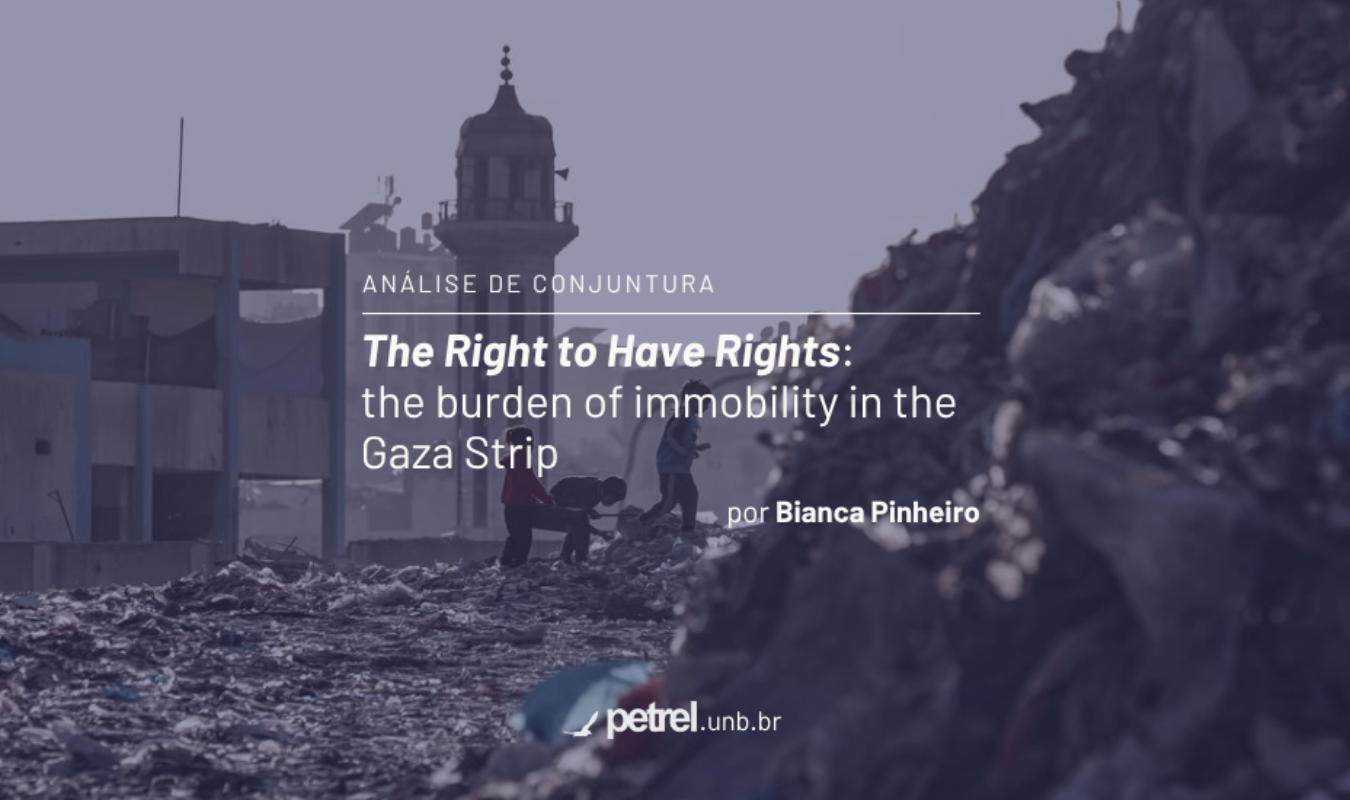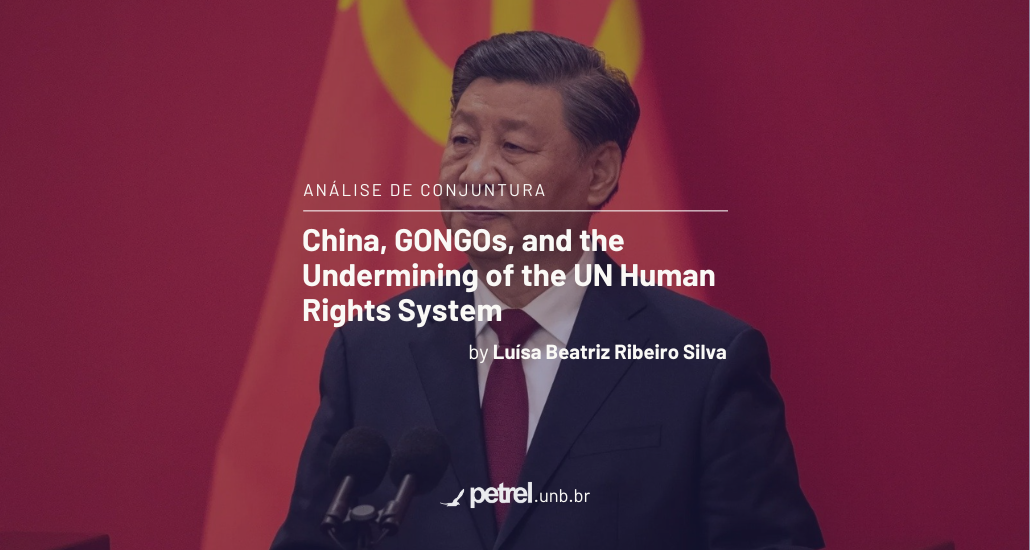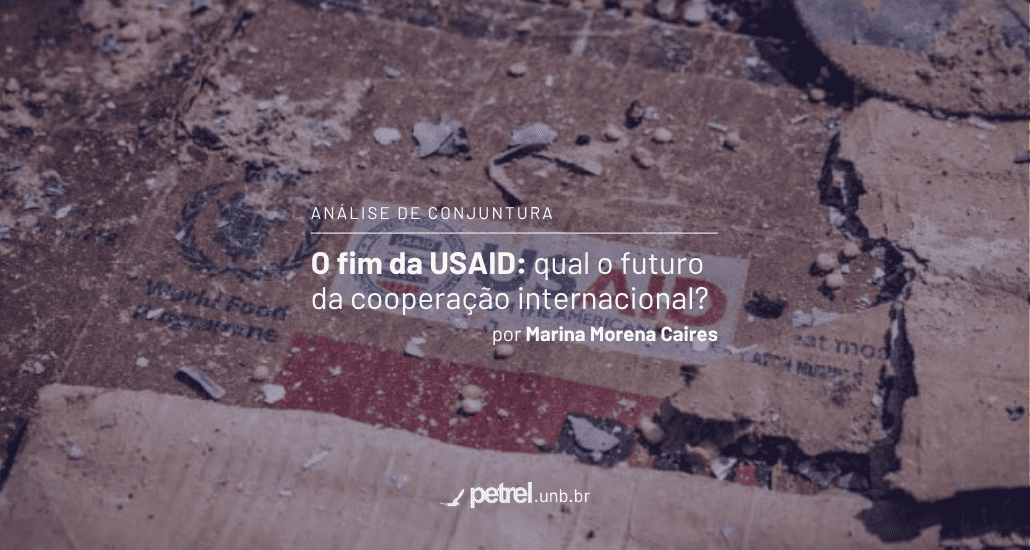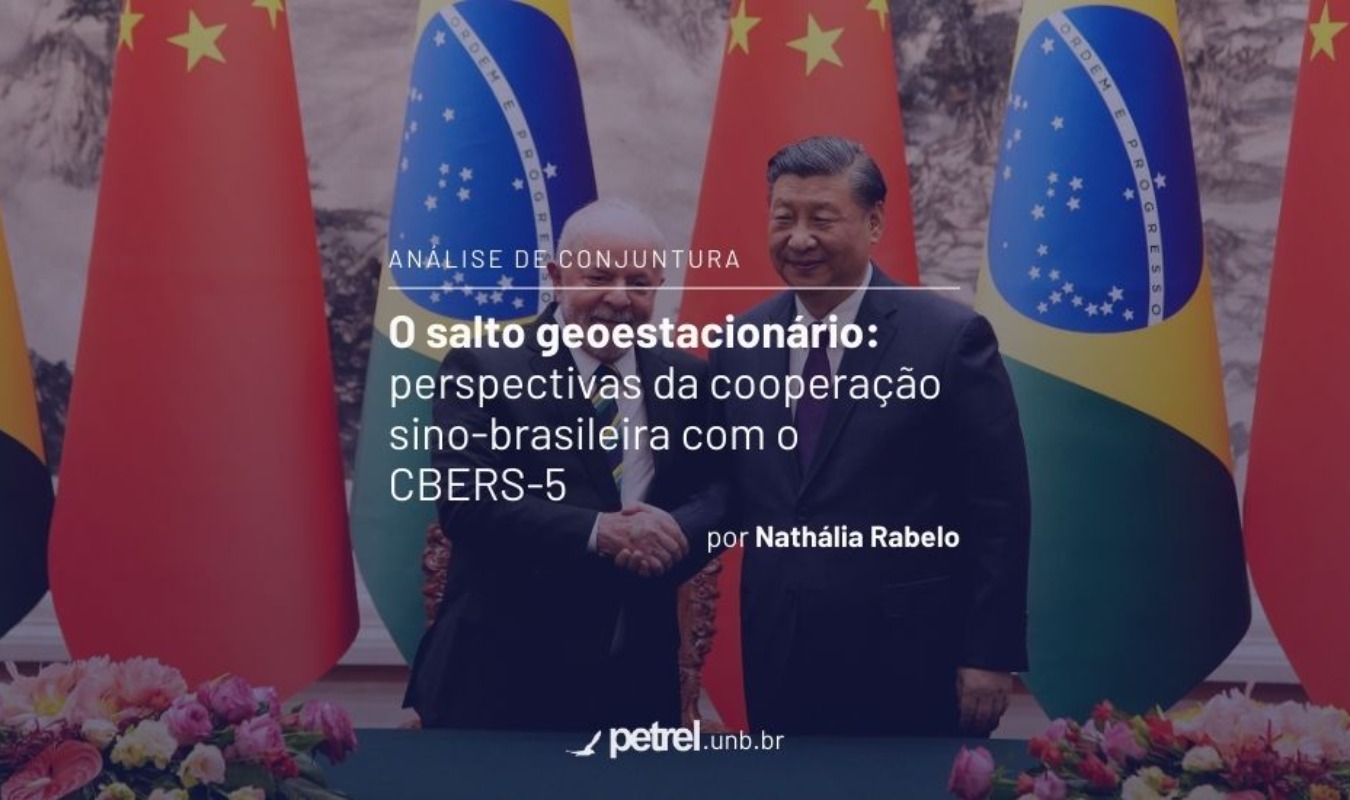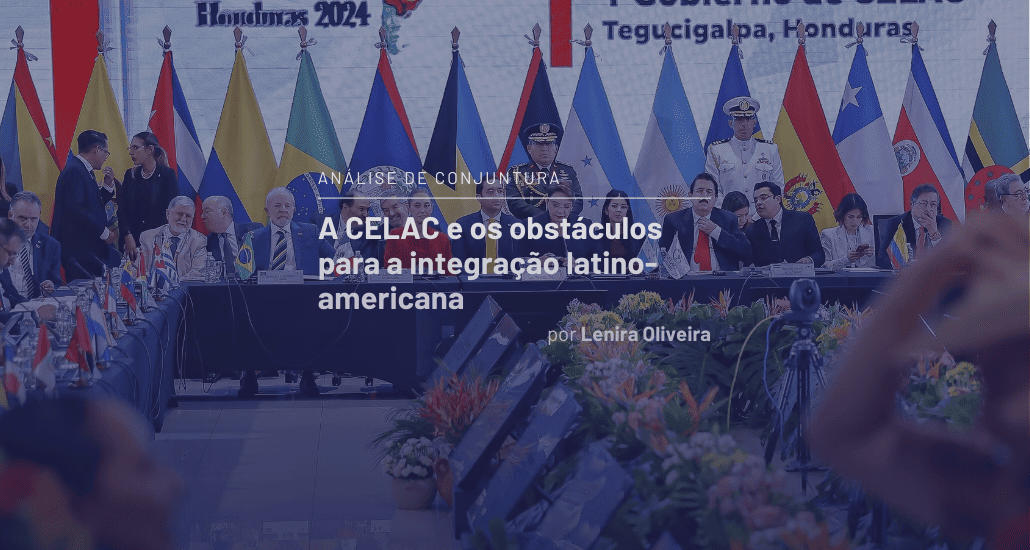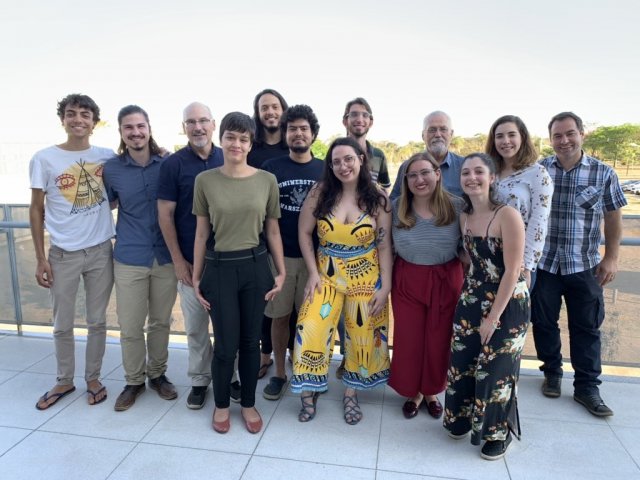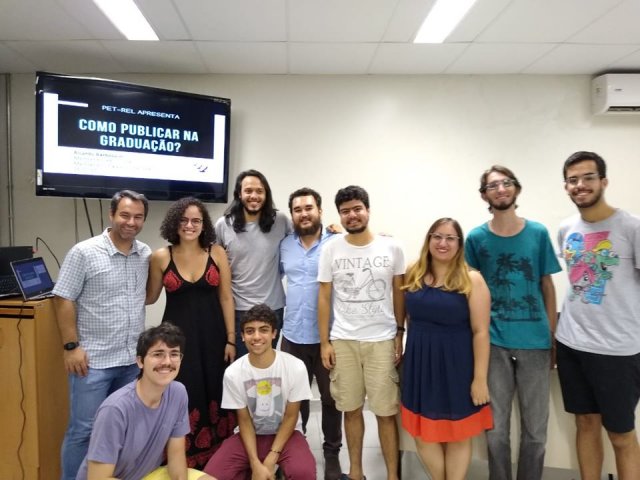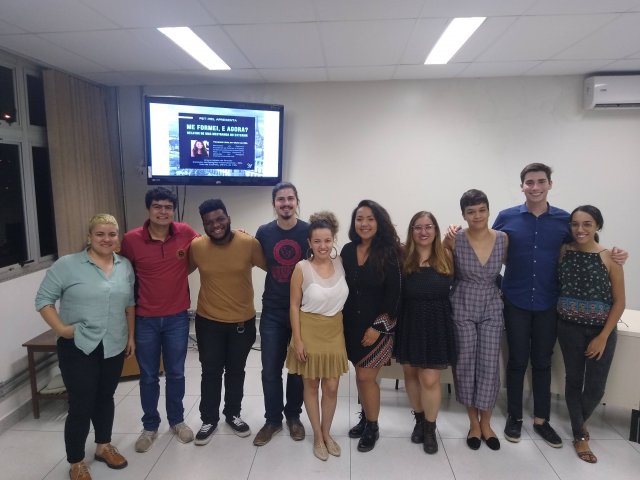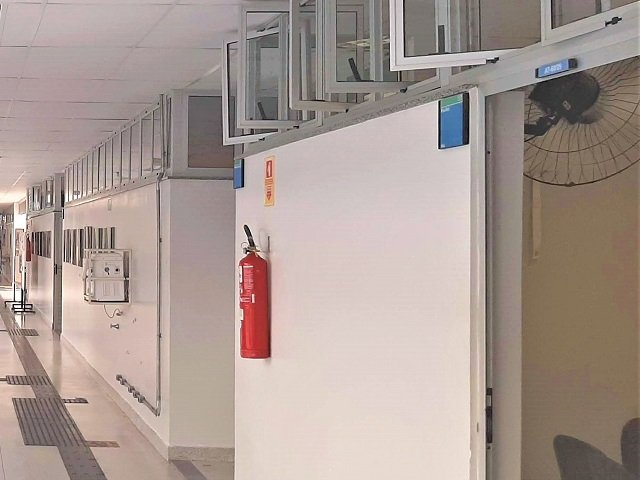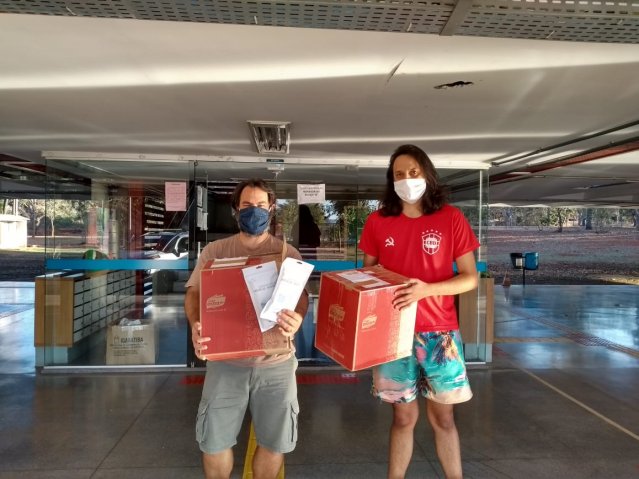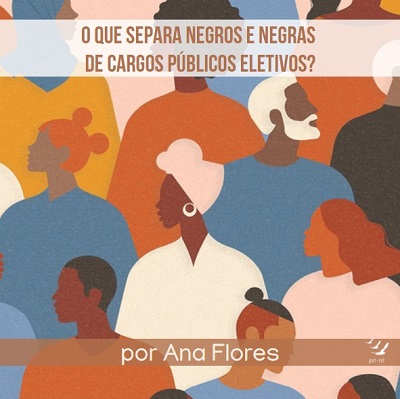-
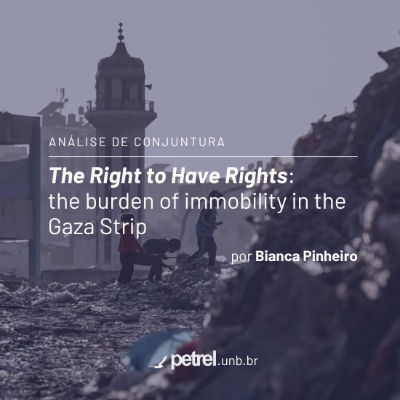 Destaques
Destaques
The Right to Have Rights: the burden of immobility in the Gaza Strip
Por Bianca Pinheiro
Since the beginning of March, a new wave of darkness has cast its shadow over the families of Gaza, with the Israeli government blocking all aid to the narrow strip of stateless land by the Mediterranean Sea. With the end to the ceasefire between Israel and Hamas, the two-month siege and sustained airstrikes across multiple Gazan cities underscore Prime Minister Netanyahu’s unwillingness to engage in lasting peace negotiations, which was made even clearer with the Security Cabinet’s plans towards full occupation of Palestine (Gritten, 2025).
Under this long war-like scenario, it becomes easy to overlook matters of mobility rights. However, the constant violations of international law on the themes of migration and refuge have direct effect on other human rights. With restrictions on emigration, and consequently on asylum claims in other countries, Palestinians are unable to leave the daily human rights violations in the Gaza Strip, where living is close to becoming a curse, amidst forced displacement, famine, disease, and violence.
Thus, this analysis will explore how the (im)mobility faced by Palestinians is taking place after the October 6th deadly attack and the following military operations by the Israel Defense Forces (IDF). With an overview of the international migration regime and of the breakdown of the ceasefire, it will be possible to establish that the statelessness of Palestinians is not the only barrier to their “right to have rights,” like Hannah Arendt explored in The Origins of Totalitarianism (1951). In this case, their immobility, promoted by Israeli authorities, have greater implications than just restrictions on movement, as it becomes one of the mechanisms of the genocide.
Mobility in International Law
According to Articles XIII and XIV of the Universal Declaration of Human Rights, every person has two guaranteed mobility rights: the right to leave their country and to seek asylum from persecution in a country that is not their own. In other words, only the right to emigrate and the right to become a refugee are protected under international migration law. When it comes to the right to immigrate, that is, the right to enter a new country, there is no international guarantee due to the principle of domaine réservé, which holds that certain affairs lie solely within a state’s domestic jurisdiction (De Wenden, 2013).
In spite of this legal gap, in which an individual can leave their country but not necessarily enter a new one, the right to emigrate is, by itself, essential to uphold basic rights, to secure core freedoms, and to promote social equality, as argued by Daniel Sharp (2023). First, emigration can function as a “safety outlet” to moments when a state no longer fulfills its responsibility to protect its people from harm. Second, the right to emigrate is directly linked to the freedom of movement, whether for leisure, work, or personal reasons. Third, emigrating allows one to leave a situation of social or political inequality in search of better conditions.
Unfortunately, the international guarantee of the right to emigrate is yet fragile. As Catherine Wihtol De Wenden exposes in Le droit d'émigrer (2013), mobility is getting more and more dictated by the most powerful countries — who instrumentalize their sovereignty to bend migration realities to their will. While emigrating becomes more accessible for the elites from the developed world, restrictions become more visible once movement originates from the Global South (De Wenden, 2013). Some borders are more artificial than others; for Palestinians, borders are rock solid.
In the case of Gaza, the rights to mobility in the region, as pronounced in the Universal Human Rights Declaration, have historically been threatened. The Palestinian Authority is unable to provide residents of Gaza and the West Bank with passports, only an Israeli-approved travel document with no indication of citizenship (PCHR, 2022). Therefore, the population in the enclave is barred from the “escape valve” of emigration. Now, Israel abuses of its sovereign powers not only to forcibly displaced millions of non-Israeli nationals, but to trap them inside a ticking bomb of its own creation.
The situation is worsened by the lack of Palestinian statehood. To Arendt (1951), nationality means more than sovereignty over the territory, because it links one to the protection of a formal state. Only a recognized national authority can, for example, provide an identification card and public services, such as healthcare and education. To her, human rights are not as universal as they are proclaimed to be, since they indirectly require one to have a legal bond to a sovereign nation. Without the creation of the State of Palestine, the Palestinian people cannot claim their land nor enjoy their entitled rights established by the Universal Declaration. However, for Gazans, their statelessness is aggravated by their imposed immobility because, under present circumstances, that has been subjecting them to a genocide.
Gaza since October: internal displacement, external impediment
As a response to the attacks orchestrated by Hamas in 2023, Israel launched military operations in Gaza that long have surpassed the excuse of self-defense. Due to the bombardments and destruction of homes and critical infrastructure, about 90% of the people from Gaza — more than 2 million individuals — have been forcibly displaced since the onset of the crisis (UN Women, 2025). It is estimated that, on average, families in Gaza have suffered from displacement more than three times over the last 20 months, with some cases reaching the tens (ACAPS, 2025). Therefore, internally, the forced movement of Palestinians constitutes a clear violation of their mobility rights, as they are effectively denied the choice to remain safely in their homes. Likewise, the option to leave Gaza is equally unattainable.
From the start of the conflict until today, it is estimated only 100 thousand Palestinians were able to exit the Strip, mainly through the Rafah crossing to Egypt (Al Jazeera, 2025a). Once military operations began, the North-African neighbor quickly restricted access through the passage; however, it still allowed entrance for aid deliveries, medical evacuations, non-Palestinian passport holders, and for those able to afford (Mhawish, 2024). Until May 2024, when Israel took control over the passage, some Palestinians were able to escape by paying up to $5 thousand per person to Egyptian brokers (Mhawish, 2024), with some sources reporting values as high as $10 thousand (Goldman, 2024). For Gazans, the only possibility to exercise their right to emigrate and seek asylum has a price most cannot pay.
The other two Israel-bordered crossings, Beit Hanoun and Karem Abu Salem, have been even more restricted, open in designated occasions for humanitarian aid trucks or urgent medical cases (Al Jazeera Staff, 2024). By enforcing blockades at Gaza's only border crossings, Israel invokes its domaine réservé to control immigration into its territory, but it does so in a manner that violates the fundamental rights of the people of Gaza. Israel went as far as disrespecting another state’s sovereignty, when the conduction of the Rafah offensive led to circumvention of Egypt’s authority over its border crossing.
Forced to flee home yet unable to escape the enclave, Palestinians are denied the opportunity to seek asylum in other countries, where they would qualify for refugee status, given their unquestioned persecution by Netanyahu’s government. This enforced immobility, while violating international law, also exposes Gazans to unchecked aggression and leads to multiple human rights violations. Unable to stay safely in their land and powerless to escape, the people of Palestine are further prevented from having any rights at all.
The failure of the cease-fire and the tragedy of the siege
When the long-awaited ceasefire between Israel and Hamas finally began to be implemented in January, the expectations of future peace negotiations were high, including among Palestinians. During the execution of Phase 1, with the exchange of hostages and prisoners, displaced families in South Gaza started their journeys home, even if it meant returning to rubble and debris (United Nations, 2025). Additionally, for the first time since the outbreak of conflict, the United Nations Relief and Works Agency for Palestine Refugees was able to deliver aid resources and food assistance on a larger scale (UNRWA, 2025). For a while, it seemed the crisis was coming to an end, as the prospects for Phase 2 and 3 of the agreement included the complete withdrawal of troops and the reconstruction of Gaza (Hassenstab, 2025).
Unfortunately, hostilities resumed a few weeks later when Israeli strikes killed hundreds across Gaza in March, under allegations of new plans for Hamas attacks (Krauss, 2025). Following the collapse of the ceasefire, as described in the lastest edition of UNRWA Situation Report, almost 665 thousand Palestinians have been displaced so far, marking yet another wave of internal displacement. Furthermore, Gaza was under a complete siege for two months, in which no medical supply, food, or water entered the enclave, until some flexibility was allowed at the end of May. Yet, the provisions that have entered since then have been insufficient (OCHA, 2025). According to the World Food Programme, the risk of famine is imminent, with all Palestinians in the Strip already facing food insecurity and tens of thousands suffering from starvation and acute malnutrition, including children. Humanitarian operations are in a state of near-collapse, as hospital missile strikes continue and supplies run dangerously low (ICRC, 2025).
Therefore, the displacement caused by bombardments and the impossibility of emigration has severe implications for other human rights. By being trapped inside a besieged territory, a stage to a coordinated genocide, Palestinians are victims of homelessness, hunger, sickness, and violence, all imposed upon them by a foreign authority, who has no sovereignty over the Gaza Strip. As the blockage continues and Netanyahu’s Cabinet start to implement the new occupation plan, Israel advances on the invaded territory by issuing evacuation orders and expanding the “no-go zones”, leaving even less shelter options for Gazans, who can now access only 30% of their land (Al Jazeera Staff, 2025). In this context, the cruel convergence of statelessness and lack of freedom of movement renders Palestinians rightless in the most fundamental sense: excluded from the international order as people without dignity, agency, and legal recognition that international human rights law is meant to guarantee.
Closing remarks
For longer than 21 months now, the two million people who survive the genocide in the Gaza Strip face countless human rights violations. The impossibility to escape and seek asylum elsewhere confines Palestinians to the epicenter of a humanitarian catastrophe. The profound consequences of the Israeli retaliation against Hamas to the livelihood in Gaza are signs of long-standing infringements of international migration law in Palestine. Forced displacement and restrictions at border-crossings worsened the toll of inhumane suffering, considering there were no routes to safety — nor the chance to safely stay. By being stateless, Palestinians already lack the legal bond which entitles them to their land and citizenship rights, but by being trapped, they are subjected to Israel’s cruel unpredictability. Without a minimal degree of mobility autonomy, the people of Gaza lose even more grasp on their right to have rights.
In the unlikely event that a new ceasefire agreement is reached, what remains for Palestinians is a legacy of trauma and open wounds, from a period marked by the denial of freedom of mobility and, with it, the absence of any real possibility for change. This period will be remembered not only for its military aggression, but for how it reinforced an authoritarian regime, where borders became instruments of oppression rather than protection, and where the international community failed to stop a massacre. As time passes, the Two-State solution moves further into a remote — perhaps unachievable — future.
Observação
Esta análise foi escrita em maio de 2025, com a última atualização realizada em 14 junho de 2025. Dessa forma, eventos e declarações posteriores não foram considerados pela autora.
Referências bibliográficas
ACAPS. Palestine: End of ceasefire and reimposition of blockade in Gaza. ACAPS, 25 mar. 2025. Disponível em: www.acaps.org/fileadmin/Data_Product/Main_media/20250325_ACAPS_Briefing_note_Palestine_End_of_the_ceasefire_and_blockade_in_Gaza.pdf. Acesso em: 18 maio 2025.
AL JAZEERA STAFF. Israel has turned 70% of Gaza into no-go zones, in maps. Al Jazeera Media Network, 6 maio 2025. Disponível em: www.aljazeera.com/news/2025/5/6/israel-has-turned-70-of-gaza-into-no-go-zones-in-maps. Acesso em: 18 maio 2025.
AL JAZEERA STAFF. Israel to ‘temporarily’ reopen north Gaza crossing for aid after Biden call. Al Jazeera Media Network, 5 abr. 2024. Disponível em: www.aljazeera.com/news/2024/4/5/israel-to-temporarily-reopen-north-gaza-crossing-for-aid-after-biden-call. Acesso em: 18 maio 2025.
AL JAZEERA. Gaza population falls 6 percent since start of war, statistics agency says. Al Jazeera Media Network, 1 jan. 2025. Disponível em: www.aljazeera.com/news/2025/1/1/gaza-population-falls-6-percent-since-start-of-war-statistics-agency-says. Acesso em: 18 maio 2025.
ARENDT, H. The origins of totalitarianism. 2. ed. Cleveland: Meridian Books, 1958.
DE WENDEN, C. W. Le droit d’émigrer. Clamecy: C.N.R.S. Editions, 2013.
GOLDMAN, L. The Cost of Leaving Gaza. New Lines Magazine, 28 fev. 2024. Disponível em: https://newlinesmag.com/reportage/the-cost-of-leaving-gaza/. Acesso em: 18 maio 2025.
GRITTEN, D. Israel security cabinet approves plan to 'capture' Gaza, official says. BBC News, Jerusalem, 5 maio 2025. Disponível em: www.bbc.com/news/articles/cwy04km1zk0o. Acesso em: 18 maio 2025.
HASSENSTAB, N. Understanding the Israel-Hamas Ceasefire Agreement. American University, 29 jan. 2025. Disponível em: www.american.edu/sis/news/20250129-understanding-the-israel-hamas-ceasefire-agreement.cfm. Acesso em: 18 maio 2025.
ICRC. After two months of aid blockage, humanitarian response in Gaza on verge of total collapse. International Committee of the Red Cross, Genebra, 2 maio 2025. Disponível em: www.icrc.org/en/news-release/israel-and-occupied-territories-after-two-months-aid-blockage-humanitarian-response-verge-collapse. Acesso em: 18 maio 2025.
KRAUSS, J. Why did Netanyahu end the Gaza ceasefire?. PBS, 18 mar. 2025. Disponível em: www.pbs.org/newshour/world/why-did-netanyahu-end-the-gaza-ceasefire. Acesso em: 18 maio 2025.
MHAWISH, M. Escaping Gaza’s war, Palestinians find little solace in Egypt. The New Humanitarian, 1 jul. 2024. Disponível em: www.thenewhumanitarian.org/news-feature/2024/07/01/escaping-gazas-war-palestinians-find-little-solace-egypt. Acesso em: 18 maio 2025.
OCHA. UN Relief Chief welcomes renewed aid deliveries to Gaza, but stresses it's only a "drop in the ocean" of what is needed. United Nations Office for the Coordination of Humanitarian Affairs, 19 maio 2025. Disponível em: https://www.unocha.org/news/un-relief-chief-welcomes-renewed-aid-deliveries-gaza-stresses-its-only-drop-ocean-what-needed. Acesso em: 14 jun. 2025.
PALESTINIAN CENTRE FOR HUMAN RIGHTS. Report on Allegedly for Security Reasons, Gaza Strip Citizens Deprived of Right to Have Passports. PCHR, nov. 2022. Disponível em: https://pchrgaza.org/pchr-issues-report-allegedly-for-security-reasons-gaza-strip-citizens-deprived-of-right-to-have-passports/. Acesso em: 14 jun. 2025.
SHARP, D. The Right to Emigrate: Exit and Equality in a World of States. Journal of Ethics and Social Philosophy, v. 24, n. 3, p. 371–408, 2023. Disponível em: www.jesp.org/index.php/jesp/article/view/2182. Acesso em: 17 maio 2025.
UN WOMEN. The long walk home: Displaced Gazans are going back. United Nations Entity for Gender Equality and the Empowerment of Women, 12 fev. 2025. Disponível em: www.unwomen.org/en/news-stories/feature-story/2025/02/the-long-walk-home-displaced-gazans-are-going-back. Acesso em: 18 maio 2025.
UNITED NATIONS. Dreams of returning home dashed by reality in Gaza City. UN News, 30 jan. 2025. Disponível em: https://news.un.org/en/story/2025/01/1159616. Acesso em: 18 maio 2025.
UNITED NATIONS. Universal Declaration of Human Rights. United Nations, Paris, 1948. Disponível em: www.un.org/en/about-us/universal-declaration-of-human-rights. Acesso em: 17 maio 2025.
UNRWA. The Gaza Strip: as phase one of lifesaving ceasefire draws to an end, UNRWA reaches 2 million people in Gaza with relief and assistance. United Nations Relief and Works Agency for Palestine Refugees in the Near East, 27 fev. 2025. Disponível em: www.unrwa.org/newsroom/news-releases/gaza-strip-phase-one-lifesaving-ceasefire-draws-end-unrwa-reaches-2-million. Acesso em: 18 maio 2025.
UNRWA. UNRWA Situation Report #175 on the Humanitarian Crisis in the Gaza Strip and the West Bank, including East Jerusalem. United Nations Relief and Works Agency for Palestine Refugees in the Near East, 13 jun. 2025. Disponível em: www.unrwa.org/resources/reports/unrwa-situation-report-175-situation-gaza-strip-and-west-bank-including-east-jerusalem. Acesso em: 14 jun. 2025.
WFP. Risk of famine across all of Gaza, new report says. World Food Programme, 12 maio 2025. Disponível em: www.wfp.org/news/risk-famine-across-all-gaza-new-report-says. Acesso em: 18 maio 2025.
-
 Destaques
Destaques
Quem tem medo das pessoas trans? O TERFismo britânico e a erosão democrática
Gabriel Modolo Capelozza Boaventura
A célebre escritora J.K. Rowling posa diante da câmera. Charuto na mão direita. Um copo de uísque na esquerda. Um sorriso de vitória. A legenda da foto diz “adoro quando um plano dá certo”. O plano ao qual a autora se refere é a recente decisão da Suprema Corte do Reino Unido que reafirma a definição legal de “mulher” como alguém do sexo biológico feminino, excluindo, portanto, mulheres trans desse reconhecimento jurídico (Davies, 2025). A manifestação de Rowling ganhou destaque nas redes sociais e expõe o cerceamento dos direitos das pessoas trans na sociedade britânica.
Assim, esta análise visa refletir sobre o retrocesso dessas garantias como expressão de um movimento de erosão democrática. A partir do contexto do Reino Unido, investiga-se como o espaço público vem sendo ocupado por discursos de exclusão identitária, legitimados pela retórica da defesa de valores e da proteção de grupos sociais. O que justifica a cruzada contra as pessoas trans em uma sociedade que se diz democrática? E até que ponto essa perseguição representa um avanço no fechamento da política enquanto espaço de pluralidade e disputa legítima por reconhecimento?
A Ilha TERF: o cerco à identidade trans no Reino Unido
Para compreender os impactos da recente decisão da Suprema Corte britânica, é necessário situá-la no contexto de formação e consolidação de discursos trans-excludentes no país. O Reino Unido tornou-se, nos últimos anos, um dos principais epicentros do movimento anti-transgênero global, em grande parte devido à ascensão do feminismo radical trans-excludente (TERF). A influência e a penetração institucional desse movimento são tamanhas que o país passou a ser frequentemente apelidado de “Ilha TERF” por analistas e ativistas (Baska, 2021).
O ano de 2017 é entendido como um ponto de inflexão para o fortalecimento de grupos TERF, marcado pelo anúncio da então primeira-ministra Theresa May acerca da proposta de reformar a Lei de Reconhecimento de Gênero de 2004 (GRA). A alteração visava permitir que pessoas trans alterassem o marcador de sexo de suas certidões de nascimento com base na autodeterminação, sem a necessidade de diagnóstico médico ou de enfrentar antigas burocracias, que eram, muitas vezes, invasivas e onerosas (Pearce; Erikainen; Vincent, 2020). A decisão foi celebrada e apoiada por diversos partidos políticos e organizações LGBTQ+. No entanto, reações adversas surgiram.
Em julho de 2018, o governo britânico realizou uma consulta pública sobre a reforma do GRA na Inglaterra e no País de Gales. No período que antecedeu a consulta, diversas organizações de campanha foram fundadas com o objetivo de se opor à autodeterminação como mecanismo para a alteração do marcador de sexo na certidão de nascimento (Pearce; Erikainen; Vincent, 2020). Grupos como A Woman’s Place UK (WPUK), Fair Play For Women (FPFW) e For Women Scotland (FWS) organizaram reuniões por todo o país, articulando as bases para um novo movimento feminista trans-excludente. Em setembro de 2020, Elizabeth Truss, a então Ministra da Mulher e Igualdade, declarou que o governo não pretendia alterar os critérios para o reconhecimento legal de gênero (Balogun; Fairbairn; Pyper, 2022).
Nesse contexto, segundo Lamble (2024), o TERFismo britânico apresenta características que o consolidam como uma força política autônoma e influente. Enquanto o movimento antigênero internacional combate uma ampla gama de políticas de gênero e sexualidade, no Reino Unido, a articulação foca quase que exclusivamente em questões trans. Uma segunda diferença é que, ao contrário de seus equivalentes internacionais, que operam sob uma lógica restauradora e patriarcal, o TERFismo britânico emerge inicialmente de setores feministas e lésbicos, majoritariamente brancos, e reivindica para si a defesa dos direitos das mulheres. Além disso, a autora enfatiza que a mobilização dessas entidades “surgiu como uma reação direta às propostas de direitos trans” (Lamble, 2024, p.3, tradução nossa) e não como projeto político de longo prazo. A autora destaca, por fim, a transversalidade política do TERFismo, uma vez que, enquanto “na maioria dos contextos globais, as políticas antitrans se alinham ao populismo de direita” (Lamble, 2024, p. 2, tradução nossa), no Reino Unido, as organizações TERF são representadas por subgrupos em todos os principais partidos políticos.
A Suprema Corte e os direitos trans
Em abril de 2025, a Suprema Corte britânica decidiu, por unanimidade, que os termos “sexo” e “mulher”, tal como estabelecidos na Lei da Igualdade de 2010, devem ser interpretados com base no sexo biológico, e não no sexo legal reconhecido por Certificado de Redesignação de Gênero (GRC) (Cochrane, 2025). A decisão encerrou uma longa disputa envolvendo o governo escocês e o grupo For Women Scotland (FWS).
O conflito iniciou-se após o Parlamento escocês aprovar uma lei destinada a promover o equilíbrio de gênero nos conselhos do setor público. O coletivo contestou a inclusão de mulheres trans nas cotas de gênero previstas pela legislação, sustentando que as proteções legais baseadas no sexo deveriam se restringir exclusivamente a pessoas designadas como do sexo feminino ao nascimento. Em resposta, o governo escocês defendeu que mulheres trans com GRC devem ter assegurados os mesmos direitos e proteções garantidos às mulheres cisgênero (Cochrane, 2025). A Suprema Corte discordou e, com isso, fixou novos contornos para o debate sobre gênero e direitos.
Embora os ministros tenham assegurado que a decisão não representa uma derrota para a comunidade trans, o veredito esvazia o valor de um documento que, por mais de 20 anos, garantiu o reconhecimento legal do sexo “para todos os fins”. A decisão exclui esse reconhecimento em contextos segregados, como esportes, enfermarias e alojamentos universitários. Sophie Lewis (2025), teórica feminista, classificou a medida como “uma derrota para todas as mulheres”, inclusive para as que, hoje, celebram essa exclusão. A autora destaca que a justificativa apresentada se apoia na noção de que o “sexo” é algo autoevidente e biologicamente determinado. No entanto, a palavra “biologia” sequer aparece na Lei da Igualdade, e o juiz Hodge recusou-se a defini-la na sentença, evidenciando que esse tipo de argumento opera menos como dado empírico e mais como instrumento de exclusão.
A decisão menciona que “mulheres que vivem no gênero masculino” — ou seja, homens trans e mulheres cis cuja aparência é considerada masculina — “também poderiam ser excluídas” (Reino Unido, 2025). Esse trecho dialoga com uma recente postagem de Maya Forstater (2025), ativista TERF britânica, em seu perfil na plataforma X (antigo Twitter), na qual declarou: “Pode parecer injusto, mas essas são escolhas de vida que as pessoas fazem. Se você se esforça ao máximo para parecer um homem, não se surpreenda se lhe negarem a entrada para mulheres.” A fala revela a lógica que sustenta as argumentações trans-excludentes: embora tentem se apresentar como racionais, essas medidas se sustentam em critérios subjetivos e estéticos — algo que, por princípio, não deveria fundamentar uma decisão judicial.
Ademais, é importante destacar que, apesar de tratar diretamente sobre os direitos de pessoas trans, a Suprema Corte não ouviu qualquer grupo trans durante o julgamento, reafirmando o silenciamento político e jurídico dessas vozes (Belcher, 2025). Entretanto, isso não significou a ausência de reações por parte de ativistas e coletivos trans e feministas. “We do not and will never recognize the authority of any government, court, or institution to determine our legitimacy. They do not know us — and they cannot name us” afirmou a nota conjunta dos grupos Ad'iyah Collective e TransFuturist Collective (2025).
Primeiro levaram os direitos trans…
É preciso lembrar que, em diversos momentos da história, processos de fechamento político e de avanço autoritário tiveram início com ataques direcionados a minorias, acompanhados da construção de inimigos internos e da disseminação de pânicos morais (Machado, 2004). Nesse sentido, a cruzada contra os direitos das pessoas trans no Reino Unido não deve ser vista somente como uma ameaça à comunidade LGBTQ+, mas como um alerta para toda a sociedade: o cerceamento de liberdades começa, muitas vezes, pelos corpos que se considera mais vulneráveis ou menos dignos de defesa.
Os dados revelam com clareza que as pessoas trans no Reino Unido estão muito mais inseridas na sociedade como vítimas de violência do que como qualquer tipo de ameaça. Eles desmontam a fantasia propagada por discursos transfóbicos, como o expresso no editorial do Estadão (Uma vitória…, 2025), que associa mulheres trans a riscos em espaços como prisões e banheiros femininos, reforçando estereótipos infundados e desconsiderando o cenário real de vulnerabilidade dessa população.
Uma pesquisa do Stonewall de 2018 (Bachman; Gooch, 2018) apontou que duas em cada cinco pessoas trans sofreram crimes de ódio naquele ano e uma em cada oito foi fisicamente atacada no trabalho por colegas ou clientes. Outros dados afirmam que quatro em cada cinco pessoas trans foram vítimas de crime de ódio nos 12 meses anteriores (Bradley, 2020). E a situação só piorou: entre 2018 e 2023, os crimes de ódio transfóbicos aumentaram 186% na Inglaterra e no País de Gales — mais do que contra qualquer outro grupo. O próprio Ministério do Interior reconheceu que esse aumento pode estar diretamente relacionado à forma como “as questões transgênero foram fortemente discutidas por políticos, pela mídia e nas redes sociais” (The truth ..., 2025).
Os dados apresentados confirmam que, no Reino Unido, a população trans encontra-se em condição de extrema marginalização social e política, o que permite caracterizá-la como uma minoria em múltiplas dimensões. Além dessa posição estruturalmente vulnerável, a comunidade trans britânica também constitui uma minoria numérica significativa. O censo de 2021 (Gender..., 2023) representou um marco ao incluir, pela primeira vez, perguntas voluntárias sobre orientação sexual e identidade de gênero. Os resultados comprovaram que 0,5% da população (262 mil pessoas na Inglaterra e no País de Gales) declararam ter uma identidade de gênero diferente daquela que lhes foi atribuída ao nascer. Entre essas pessoas, 0,1% se identificaram como mulheres trans (48 mil) e 0,1% como homens trans (também 48 mil), enquanto 0,06% se declararam não binárias (30 mil), e outras 18 mil pessoas escreveram identidades de gênero diversas no campo aberto. A vulnerabilidade é percebida, também, com o desmonte dos serviços de saúde essenciais. Sabe-se que 86,9% das pessoas trans afirmaram que a demora no acesso a hormônios afetou negativamente a saúde mental, e 83,8% relataram o mesmo em relação à espera por cirurgias (Grassian, 2022).
Diante do que foi exposto, a conjuntura revela com clareza uma lógica de “bode expiatório”: desloca-se a crise da ordem de gênero, do patriarcado e das inseguranças sociais mais amplas para uma população numericamente pequena e socialmente marginalizada, atribuindo às pessoas trans a falsa origem de um colapso simbólico e cultural.
Considerações finais
A análise da decisão da Corte britânica permitiu compreender que a ofensiva contra os direitos das pessoas trans não é uma tragédia isolada. Na realidade, essa situação revela-se como um exemplo de como a diversidade de existências é, em muitos casos, colocada sob suspeita nas democracias liberais ocidentais. Mais do que isso, expõe como discursos de exclusão identitária podem se alastrar mesmo em contextos que, historicamente, foram marcados por avanços em matéria de igualdade de gênero e direitos civis.
É preciso afirmar que o ataque contra as pessoas trans em curso no Reino Unido constitui uma violação dos princípios fundamentais que sustentam qualquer democracia plural. Quando uma sociedade naturaliza a exclusão de um grupo, ela abre precedentes perigosos para outras exclusões, comprometendo sua própria legitimidade como espaço de deliberação coletiva e respeito mútuo.
O combate à transfobia exige mobilizações concretas. A democracia não deve temer o plural, mas se refazer nele. Porque, afinal, quem tem medo das pessoas trans talvez tema, na verdade, o que elas revelam: que outras formas de existir e de organizar o mundo não só são possíveis, como já estão entre nós.
Referências Bibliográficas
AD'IYAH COLLECTIVE. Womanhood is not assigned! [...]. 17 abr. 2025. Instagram: adiyahcollective. Disponível em: https://www.instagram.com/p/DIin9QrNg7h/?img_index=6. Acesso em: 21 mai. 2025.
BACHMAN C. L.; GOOCH B. LGBT in Britain: Trans report. Stonewall, 2018. Disponível em: www.stonewall.org.uk/lgbt-britain-trans-report. Acesso em: 21 mai. 2025.
BALOGUN, B.; FAIRBAIRN, C.; PYPER, D. Gender Recognition Act reform: consultation and outcome. House of Commons Library, 18 fev. 2022. Disponível em:https://commonslibrary.parliament.uk/research-briefings/cbp-9079/. Acesso em: 20 mai. 2025.
BASKA, M. Aspiring scholar explains in the simplest of terms why ‘the UK became TERF island’. The Pink News, 01 out. 2021. Disponível em: https://www.thepinknews.com/2021/10/01/transphobia-uk-terf-island-tiktok/. Acesso em: 19 mai. 2025.
BELCHER, H. Response by TransActual to Supreme Court ruling on Equality Act. TransActual. 16 abr. 2025. Disponível em: https://transactual.org.uk/blog/2025/04/16/response-by-transactual-to-supreme-court-ruling-on-equality-act/?utm_source=chatgpt.com. Acesso em: 08 jun. 2025.
BRADLEY, C. Transphobic Hate Crime Report 2020. Galop, 2020. Disponível em:https://www.galop.org.uk/resources/transphobic-hate-crime-report-2020. Acesso em: 21 mai. 2025.
COCHRANE, A. Supreme Court backs 'biological' definition of woman. BBC, 16 abr. 2025. Disponível em: https://www.bbc.com/news/articles/cvg7pqzk47zo. Acesso em: 21 mai. 2025.
DAVIES, C. JK Rowling’s journey from Harry Potter creator to gender-critical campaigner. The Guardian, 18 abr. 2025. Disponível em: https://www.theguardian.com/books/2025/apr/18/jk-rowling-harry-potter-gender-critical-campaigner. Acesso em: 16 mai. 2025.
FORSTATER, M. That may seem unfair [...]. 18 abr. 2025. X: MForstater. Disponível em: https://x.com/MForstater/status/1913185941977510055. Acesso em: 21 mai. 2025.
GRASSIAN, T. Transition Access Survey 2022. TransActual UK, 2022. Disponível em: www.transactual.org.uk/transition-access-22. Acesso em: 20 mai. 2025.
LAMBLE, S. Confronting complex alliances: Situating Britain’s gender critical politics within the wider transnational anti-gender movement. Journal of lesbian studies, v. 28, n. 3, p. 504-517, 2024.
LEWIS, S. The UK’s Anti-Trans Ruling Is a Defeat for All Women. The Nation, 23 abr. 2025. Disponível em: https://www.thenation.com/article/society/supreme-court-trans-ruling-analysis-uk/. Acesso em: 19 mai. 2025.
GENDER identity, England and Wales: census 2021. Office for National Statistics. Reino Unido, 2023. Disponível em:https://www.ons.gov.uk/peoplepopulationandcommunity/culturalidentity/genderidentity/bulletins/genderidentityenglandandwales/census2021. Acesso em: 20 mai. 2025.
MACHADO, C. Pânico Moral: Para uma Revisão do Conceito. Interações: Sociedade E As Novas Modernidades, 4. 2004 Disponível em: https://interacoes-ismt.com/index.php/revista/article/view/125
PEARCE, R.; ERIKAINEN, S.; VINCENT, B.. TERF wars: An introduction. The Sociological Review, v. 68, n. 4, p. 677-698, 2020.
REINO UNIDO. Supreme Court. For Women Scotland Ltd (Appellant) v The Scottish Ministers (Respondent). [2025] UKSC 16, julgamento em 16 abr. 2025. Disponível em: https://www.supremecourt.uk/cases/uksc-2024-0042.html. Acesso em: 21 mai. 2025.
THE truth about trans: A Q&A to help build understanding around trans people and the issues they face. Stonewall, 2025. Disponível em: https://www.stonewall.org.uk/resources/lgbtq-hubs/trans-hub/the-truth-about-trans. Acesso em: 19 mai. 2025.
UMA vitória das mulheres. Estadão, 20 abr. 2025. Disponível em: https://www.estadao.com.br/opiniao/uma-vitoria-das-mulheres/. Acesso em: 08 jun. 2025.
Acesso em: 08 jun. 2025.
-
 Destaques
Destaques
China, GONGOs, and the Undermining of the UN Human Rights System
Luísa Beatriz Ribeiro Silva
Debates surrounding China and human rights consistently generate controversy within the international arena. In April, reputable outlets such as Le Monde and The Washington Post published sensitive information revealing how the Chinese government has been exerting influence over United Nations mechanisms, particularly the United Nations Human Rights Council (Leplâtre, 2025; Miller, Ćosić, Lee-Smith, 2025). Both investigations presented credible evidence of activist intimidation, internal procedural manipulation, and —most alarmingly—the establishment of fake non-governmental organizations, commonly referred to as GONGOs (Government-Organized Non-Governmental Organizations), aimed at distorting or suppressing criticism within multilateral forums. This strategy reflects what scholars describe as transnational repression—an approach whereby states seek to extend their authoritarian reach beyond national borders by monitoring, intimidating, or restricting the actions of diaspora communities and civil society actors overseas (Tsourapas, 2020). That such practices thrive under the cover of institutional legitimacy reveals not merely China's strategy, but a fundamental failure of the system to prevent the co-optation of its own rules.
Nowadays, China has positioned itself within the international order as a rising global power. Backed by advancements in high-end technology, a robust economy, and growing diplomatic influence, the country presents itself as a model of development (Zhao, 2010). However, its most prominent vulnerability in inserting itself in multilateral organisms lies in the domain of human rights (Nathan, 2015). The Chinese government faces widespread allegations of human rights violations, including restrictions on freedom of expression and religion, the persecution and torture of Uyghur Muslims, and the repression of Tibetan culture and language, among others (Amnesty International, s.d). These repressive measures are often justified by Chinese authorities as necessary for maintaining social stability and national unity (Amnesty International, s.d). The system’s tolerance for these justifications illustrates how states can exploit sovereignty norms to neutralize human rights oversight.
In light of these challenges, the Chinese Communist Party (CCP) has identified a strategic means of mitigating international scrutiny by carefully curating its image abroad. This analysis aims to examine how the use of GONGOs by China influences the functioning of UN human rights mechanisms and to explore the broader geopolitical implications of this strategy, which signals a deeper and more structural challenge to the legitimacy and operation of multilateral governance. This is not an isolated maneuver by China, but a symptom of a global order where powerful actors routinely reshape norms to serve national interests, exposing deep systemic vulnerabilities.
The Trump Administration and Multilateral Vacuums
While the second Trump administration unfolds, there is no doubt that the international environment is going through a period of uncertainty. As Trump ended historic alliances, applied tariffs to almost every country in the world, and distanced the United States from multilateralism —including its 2018 withdrawal from the Human Rights Council— China presented itself as a possible counterpart to challenge U.S. hegemony. In areas where the United States faltered, China positioned itself as a candidate for leadership. For example, through initiatives such as the Belt and Road Initiative (BRI), its increasing influence within UN specialized agencies, and the creation of alternative institutions like the Asian Infrastructure Investment Bank (AIIB), which indicate a dual strategy of occupying spaces in existing Western-led institutions while also promoting parallel mechanisms that reflect its own strategic interests (Zhao, 2010). The emergence of alternative institutions is not inherently problematic, but when these operate without normative guardrails, they expose the absence of enforceable standards across the international system to prioritize already existing mechanisms, which leads to greater fragmentation of the multilateral system.
However, to consolidate its leadership claims, China must recalibrate its international image —especially regarding its commitment to human rights (Richardson, 2020). Its credibility and capacity for deeper insertion into the multilateral system depend not only on economic influence or institutional presence, but also on the legitimacy perceived by the international community. In this sense, soft power becomes a critical dimension: the ability to attract and shape preferences through culture, values, and policies is central to legitimizing its rise as global power. China's challenges in this area—particularly due to its human rights record—undermine its efforts to be seen as a trustworthy leader. A credible engagement with multilateral norms, including human rights, is therefore not just a matter of reputation, but a strategic requirement for sustaining long-term influence within global governance structures.
The United Nations mechanisms, particularly the Human Rights Council, pose a strategic challenge to states like China, as some of its councils enable the participation of civil entities. This means that organizations outside government structures can speak up during sessions to expose national human rights realities, potentially undermining state-controlled narratives. While the inclusion of civil society is celebrated, the system provides insufficient checks to prevent its distortion by states intent on silencing dissent.
The Human Rights Council is an intergovernmental body within the UN system responsible for strengthening the promotion and protection of human rights around the globe and for addressing violations and making recommendations (United Nations Human Rights Council, s.d). In the plenary, delegates from 47 member states have the floor to discuss important matters regarding the promotion or violations of human rights.
To increase representation, NGOs are welcomed as observers to the sessions, provided that they have consultative status with the United Nations Economic and Social Council (United Nations Human Rights Council, s.d). This consultative status ensures that the organization has applied through appropriate procedures and has proven itself to be reputable, with recognized contributions in its field. NGOs with this status are allowed to attend meetings, submit statements, and make oral interventions, enabling them to influence policy decisions and share expertise with the UN. This measure is vital, as it enables civil society to advocate within international institutions and opens space for marginalized communities to have a voice (Vreche, 2020; Burkhalter, 2023). However, this system also creates a vulnerability: actors with strategic interests can manipulate these rules to project state-controlled entities as autonomous civil society, reproducing a practice of transnational repression and undermining multilateral governance.
GONGOs and the Infiltration of UN Processes
The present problem elucidates how this supposedly reputable and serious space is subject to manipulation. While GONGOs claim NGO status, they differ fundamentally by serving state agendas, particularly in authoritarian regimes. Evidence suggests that certain Chinese NGOs were being sponsored by the CCP to promote a curated narrative, discredit dissident opinions, and obstruct criticism (Leplâtre, 2025; Miller; Ćosić, Lee-Smith, 2025). Le Monde and The Washington Post revealed that of approximately 106 Chinese NGOs registered with the UN, at least 50 were tied to the CCP (Leplâtre, 2025; Miller, Ćosić, Lee-Smith, 2025). These include organizations with names such as the China Society for Human Rights Studies, the China Foundation for Human Rights Development, and the China Ethnic Minorities’ Association for External Exchanges (Miller, Ćosic, Lee-Smith, 2025). Despite their formal designation as non-governmental entities, findings revealed that more than 50 of these organizations' constitutive documents required party authorization for the hiring of employees, demonstrating high influence of the government within the organization (Miller, Ćosic, Lee-Smith, 2025). Furthermore, 46 of their leaders simultaneously held positions in government agencies (Miller, Ćosic, Lee-Smith, 2025).
This alleged influence is particularly concerning given the increasing presence of Chinese NGOs in UN plenary sessions. In nearly 300 sessions analyzed, 33 Chinese NGOs participated —yet none of their statements contained any criticism of the Chinese government (Miller, Ćosic, Lee-Smith, 2025). This pattern strongly suggests a coordinated effort by Beijing to control the narrative within these international forums. Furthermore, it also undermines the credibility of international mechanisms that rely on open and pluralistic civil society participation, ultimately weakening the institutions meant to uphold universal human rights standards.
Moreover, Chinese human rights activists affiliated with independent NGOs —those not linked to the CCP— have reportedly faced intimidation and surveillance, allegedly carried out by entities believed to be connected to the Chinese government (Lee-Smith, Ćosic, 2025; Wee, Nebehay, 2015). For instance, Chinese human rights defenders have reported being followed, filmed, and harassed during their presence at UN sessions —acts corroborated by testimonies gathered by the International Consortium of Investigative Journalists (Lee-Smith, Ćosić, 2025). In one documented case, activist Dolkun Isa, a Uyghur representative, was expelled from a UN meeting after complaints from the Chinese delegation (Agence France-Presse, 2023). Such actions raise serious concerns about the safety of civil society actors and the integrity of the UN's human rights mechanisms. While the journalistic investigations provide solid leads, it is critical to recognize the UN’s limited capacity to internally verify such relationships, making this form of manipulation even more insidious and difficult to confront.
UN Constraints and Diplomatic Limitations
The United Nations has acknowledged concerns regarding the use of government-organized non-governmental organizations (GONGOs) within its human rights mechanisms (Miller, Ćosic, Lee-Smith, 2025). However, the organization's response has been measured, reflecting the complexities of international diplomacy, the decline of multilateral governance and the influence of powerful member states (Miller, Ćosic, Lee-Smith, 2025).
In response to growing international criticism regarding its conduct in multilateral human rights mechanisms, the Chinese government has publicly reiterated its commitment to a “people-centered” approach grounded in national sovereignty. In February 2025, a statement published by the Permanent Mission of China to the United Nations in Geneva, the Chinese Ministry of Foreign Affairs called for the reform and improvement of global human rights governance, emphasizing the need for inclusivity and the rejection of double standards and external interference (Ministry of Foreign Affairs of the People's Republic of China, 2025). Although the statement does not directly address the allegations concerning the use of GONGOs, it reveals the narrative through which China seeks to reframe the debate on human rights at the international level.
On the other hand, some countries have called for stricter accreditation processes for NGOs to ensure genuine civil society participation (Shah, 2024). Nevertheless, the UN's capacity to implement significant reforms is constrained by the need for consensus among its diverse membership, including influential states like China. Additionally, the current normative and bureaucratic framework lacks enforcement mechanisms capable of distinguishing between legitimate and state-controlled NGOs without triggering diplomatic backlash (Shah, 2024). This regulatory gap highlights a deeper governance failure in the multilateral system—where institutional inertia and political sensitivities routinely override accountability, leaving human rights mechanisms increasingly vulnerable to instrumentalization by authoritarian actors.
Impacts on the System and the Rise of Transnational Repression
Such interference supports the growing body of literature on transnational repression or transnational authoritarianism. According to Tsourapas (2020), this refers to “any effort to prevent acts of political dissent against an authoritarian state by targeting one or more existing or potential members of its emigrant or diaspora communities.”
Through the infiltration of the UN system using GONGOs, China undermines and discredits international human rights mechanisms. It uses state instruments to act beyond its borders, manipulating narratives and silencing communities. This strategy deeply affects civil society, spreading practices of intimidation, silencing, and marginalization, thereby discouraging genuine participation in global governance (Leplâtre, 2025; Miller, Ćosić, Lee-Smith, 2025). The space for denouncing human rights violations is minimized in a forum increasingly co-opted and intimidating. Structurally, the multilateral system was designed to guarantee human rights through mechanisms that prioritize civil society participation. However, what is increasingly evident is that these same mechanisms —intended as safeguards— can be exploited by actors who nominally follow the rules while systematically undermining their substance. The GONGOs case illustrates how institutional loopholes and the absence of effective enforcement allow for the distortion of mechanisms rooted in universal values and cooperation.
As China rises into the system as a global power, it leverages both its active diplomacy and economic strength to consolidate influence. Within this context, it perpetuates an asymmetric power dynamic. Authentic NGOs and activists are disadvantaged when faced with a state actor that possesses virtually unlimited resources, institutional access, and coercive capabilities. In this regard, GONGOs function not just as propaganda tools, but as instruments of a broader reconfiguration of international spaces, where the multilateral system is increasingly being undervalued and delegitimized.
Conclusion
These scenarios reveal the structural limits of contemporary multilateralism. The instrumentalization of global governance mechanisms by powerful states such as China highlights the fragility of international institutions when confronted with actors that exploit rules for strategic gain rather than shared values (Shah, 2024). It raises fundamental questions about the effectiveness and interest of the current global governance architecture in holding powers accountable or ensuring the protection of universal rights.
More than an isolated problem, the case of GONGOs reveals a broader strategic trend: the reconstruction of international norms and platforms in ways that erode institutional credibility and reshape the multilateral system to reflect shifting power dynamics, all under the language of legitimacy and engagement. It is important, however, to recognize that China is not alone in instrumentalizing multilateral institutions. Critical literature highlights how global governance structures, including the UN, have historically been shaped by the political interests of dominant powers. Thus, rather than framing China as a singular actor, its conduct should be understood as part of a broader pattern of strategic institutional capture to consolidate itself as a power, like others have done. Understanding and responding to this trend is essential if the global system is to maintain its normative credibility and operational viability in the years to come, especially where human rights are concerned.
References
AGENCE FRANCE-PRESSE. China Tries to Block Prominent Uyghur Speaker at UN. VoaNews, 23 mar. 2023. Disponível em: https://www.voanews.com/a/china-tries-to-block-prominent-uyghur-speaker-at-un-/7019424.html. Acesso em: 30 jun. 2025.
ALECCI, S. Cyberattack against Uyghur rights activists shows hallmarks of Chinese repression tactics, researchers say. ICIJ, 28 abr. 2025. Disponível em: https://www.icij.org/investigations/china-targets/cyberattack-against-uyghur-rights-activists-shows-hallmarks-of-chinese-repression-tactics-researchers-say/. Acesso em: 10 mai. 2025.
AMNESTY INTERNATIONAL. Everything You Need to Know about Human Rights in China 2020. Amnesty International, [s.d]. Disponível em: https://www.amnesty.org/en/location/asia-and-the-pacific/east-asia/china/report-china/.Acesso em: 8 mai. 2025.
BURKHALTER, D. O difícil caminho das ONGs para obter acesso à ONU. SwissInfo, 31 mar. 2023. Disponível em: https://www.swissinfo.ch/por/politica/ongs-enfrentam-dificuldades-para-ter-acesso-%C3%A0-onu/48325400?utm_source. Acesso em: 13 maio. 2025.
LEPLÂTRE, S. A l’ONU, le travail de sape des fausses ONG chinoises. Le Monde, 30 abr. 2025. Disponível em: https://www.lemonde.fr/international/article/2025/04/30/a-l-onu-le-travail-de-sape-des-fausses-ong-chinoises_6601872_3210.html. Acesso em: 8 mai. 2025.
LEE-SMITH, T.; ĆOSIĆ, J. At the U.N., China is deploying a growing army of puppet organizations to monitor and intimidate human rights activists. ICIJ, 28 abr. 2025. Disponível em: https://www.icij.org/investigations/china-targets/united-nations-ngo-gongo-intimidate-human-rights/. Acesso em: 10 mai. 2025.
MILLER, G.; ĆOSIĆ, J.; LEE-SMITH, T. China deploys NGOs to quash criticism at U.N. organizations in Geneva. Washington Post, 28 abr. 2025. Disponível em: https://www.washingtonpost.com/world/2025/04/28/china-ngos-un-geneva/. Acesso em: 8 mai. 2025.
NATHAN, A. China 's Challenge. Journal of Democracy, v. 26, n. 1, p. 156–170, 2015.
RICHARDSON, S. China's Influence on the Global Human Rights System. Washington, D.C: Brookings Institution, 2020.
SHAH, I. Progress at a price: UN NGO Committee reforms yield mixed results. Democracy Without Borders, 21 ago. 2024. Disponível em: https://www.democracywithoutborders.org/33092/progress-at-a-price-un-ngo-committee-reforms-yield-mixed-results. Acesso em: 14 maio. 2025.
TSOURAPAS, G. Global Autocracies: Strategies of Transnational Repression, Legitimation, and Co-Optation in World Politics. International Studies Review, v. 23, n. 3, 29 ago. 2020.
UNITED NATIONS HUMAN RIGHTS COUNCIL. OHCHR | HRC | Welcome to the Human Rights Council. Disponível em: https://www.ohchr.org/en/hr-bodies/hrc/about-council. Acesso em: 15 mai. 2025.
VRECHE, C. A Sociedade Civil na Política Internacional: Os Papeis das ONGs na Construção do Regime Internacional de Direitos Humanos. Anais XI Seminário Nacional Sociologia e Política, p. 1–18, 2020.
WEE, S.; NEBEHAY, S. At U.N., China uses intimidation tactics to silence rights activists. Reuters, 6 out. 2015. Disponível em: https://www.reuters.com/investigates/special-report/china-softpower-rights/. Acesso em: 12 mai. 2025.
ZHAO, S. The China Model: Can It Replace the Western Model of modernization? Journal of Contemporary China, v. 19, n. 65, p. 419–436, 28 abr. 2010.
-
 Destaques
Destaques
Extrema direita na Romênia: a porta de entrada para a influência russa
Anna Luiza Fagundes
Recentemente, a Romênia passou por um conturbado processo eleitoral que resultou na eleição do centrista Nicușor Dan (CNN Brasil, 2025). Antes da definição do novo presidente, em novembro de 2024, o líder de extrema direita, Calin Georgescu, venceu o primeiro turno das eleições presidenciais, contrariando as pesquisas de intenção de voto, que lhe atribuíam apenas 5% da preferência do eleitorado (Henley, 2025). Contudo, às vésperas do segundo turno, o Tribunal Constitucional anulou o escrutínio anterior e, posteriormente, impediu Georgescu de concorrer novamente, com base em documentos de inteligência desclassificados que apontavam financiamento ilegal e interferência russa em sua campanha (Verseck, 2025). Tais relatórios revelam mais de 85 mil ataques cibernéticos ao sistema de computadores eleitoral, além da amplificação de conteúdo por contas anteriormente inativas no TikTok e do pagamento de influenciadores digitais para promover a candidatura (Henley, 2025).
Mais precisamente, a ascensão da extrema direita na Romênia tem se apoiado em um discurso anti-establishment, anti-OTAN e pró-Rússia, sustentado por um nacionalismo cristão e pela disseminação de teorias da conspiração. Essa retórica encontrou ressonância em uma sociedade marcada pela desigualdade, pela fragilidade institucional e pela descrença generalizada na capacidade de transformação por parte da classe política tradicional (Rainsford, 2024). Embora a população romena se oponha majoritariamente às ambições russas — o que exige cautela na manifestação de apoio explícito a Vladimir Putin pelos candidatos —, o conteúdo promovido por esses grupos têm mobilizado ressentimentos sociais, impulsionando a oposição à ajuda à Ucrânia e à presença da Organização do Tratado do Atlântico Norte (OTAN) no país (Anghel, 2024).
No plano internacional, observa-se uma intensificação das tentativas russas de interferência em países que compunham a antiga esfera soviética. Nesse sentido, a potência eurasiática tem instrumentalizado, com relativo sucesso, o descontentamento popular para promover seus interesses estratégicos na Romênia. Apesar das negações oficiais do governo russo (Cole, 2024), as denúncias ganham plausibilidade diante dos antecedentes de Moscou em manipulações eleitorais, como observado na Geórgia e na Moldávia (Sheinberg, 2025).
A partir da conjuntura descrita, pretende-se analisar de que maneira a Rússia tem se aproveitado da instabilidade social na Romênia para avançar seus objetivos políticos e de segurança na região. Para tanto, será essencial compreender as razões pelas quais plataformas de extrema direita, instrumentalizadas pelo Kremlin, têm conquistado crescente protagonismo na política doméstica romena.
A revolta dos ressentidos
Para explicar a adesão das classes socialmente mais desfavorecidas a movimentos de extrema direita, o professor Jessé Souza propõe a noção da “síndrome do Coringa”. Segundo ele, trata-se de um fenômeno no qual “o cidadão empobrecido e que não conhece as causas de seu sofrimento” (Souza, 2024, p. 15) acaba se identificando com discursos extremistas que, embora aparentemente contestatórios, favorecem as elites. Essa adesão se dá pela construção social de uma “fantasia” em torno das origens e das causas de desigualdades, uma vez que as plataformas de extrema direita instrumentalizam as insatisfações causadas pelo capitalismo e as direcionam a inimigos fabricados — como imigrantes, comunistas, ou o que melhor convier na realidade nacional — que seriam, nessa concepção, constantemente favorecidos pelos grupos detentores do aparato estatal. Conforme afirma o autor, “os Coringas do mundo atual e seu sofrimento são a matéria-prima essencial para a falsa rebelião da extrema direita no mundo todo” (Souza, 2024, p. 19).
Nesse contexto, as apurações eleitorais da Romênia evidenciam um esgotamento por parte da população em relação à política tradicional, vigente desde a queda do regime soviético. O voto, nesse caso, expressa frustrações acumuladas e ressentimentos contra o sistema, ou establishment (Henley, 2025). Isso ocorre porque o país apresenta baixos níveis de renda familiar, inflação elevada, alta proporção da população em risco de pobreza, precariedade dos serviços públicos e profundas desigualdades socioeconômicas, problemas atribuídos aos governos anteriores. Soma-se a esses fatores o descontentamento com a ajuda militar, financeira e humanitária prestada à Ucrânia, que passou a representar mais um canal de expressão das insatisfações populares (Henley, 2025). Desde 2022, o Estado romeno tem fornecido equipamentos militares, facilitado a exportação de grãos ucranianos por meio de seus portos, abastecido o país com eletricidade e combustível, além de ter sediado o treinamento de pilotos ucranianos em caças F-16 (Mukhina, 2025). Essas ações têm sido percebidas como extremamente onerosas por parcela da população.
Aproveitando-se desse cenário, Georgescu foi capaz de capturar e vocalizar o sentimento coletivo de desalento. Após votar, o presidenciável publicou nas redes sociais que sua candidatura era “por aqueles que sentem que não importam, mas que, na verdade, são os que mais importam” (Henley, 2024), recorrendo à retórica populista clássica da oposição entre “nós” e “eles” — um recurso eficiente de mobilização popular. Por meio das redes sociais, o candidato construiu sua imagem como a solução para os dilemas enfrentados pelas massas, projetando-se como um líder forte, capaz de oferecer estabilidade em meio à incerteza (Henley, 2025).
O crescimento inesperado de sua popularidade, somado à exaustão da sociedade em relação aos partidos que historicamente dominaram o cenário político romeno, desencadeou uma forte reação popular à decisão do Tribunal Constitucional, que o tornou inelegível. Protestos violentos e manifestações de apoio ao candidato se multiplicaram em diversas regiões do país (Al Jazeera, 2025). Todo esse cenário traz à tona o desgaste do modelo de democracia liberal, o qual tem se mostrado incapaz de solucionar, de forma eficaz, os diversos problemas sociais que assolam as classes mais vulneráveis. Retomando a analogia com o personagem Coringa, Souza caracteriza a população que adere aos projetos da extrema direita, tornando o aparato institucional do país mais frágil e vulnerável, da seguinte maneira:
Sem sindicato, sem partido confiável e sem compreender o contexto social maior no qual está inserido, por que também toda a grande imprensa foi comprada, é a violência bestial e sem direção que passa a ser a crítica possível a um mundo com poucos vencedores e muitos perdedores (Souza, 2024, p 17).
Em meio às incertezas e à fragilidade social, política e institucional, a Romênia se tornou um terreno fértil para a promoção dos interesses russos na região do Leste Europeu, especialmente por se tratar de um país próximo ao Ocidente. A dominação do cenário político por grupos clientelistas, presentes nos partidos tradicionais e na elite estabelecida, que promovem um modelo de governança irresponsável (Verseck, 2025), abriu caminho para o cenário instalado. É nesse contexto que desenvolvem-se desilusões acerca dos benefícios de integrar a OTAN e a União Europeia, na medida em que tais organizações passam a ser associadas a esse establishment visto como corrupto, que não levou nenhum benefício real à população (Colibasanu, 2024).
Nacionalismo romeno a serviço de Moscou
Para compreender adequadamente como as forças políticas extremistas atuam na Romênia de forma a favorecer os interesses geopolíticos de Moscou, é essencial caracterizar os grupos e lideranças envolvidas. Calin Georgescu tem sido descrito como um teórico da conspiração, extremista de direita pró-Rússia e simpatizante do movimento fascista cristão ortodoxo “Guarda de Ferro”, ativo no período entreguerras (Verseck, 2025). Durante sua campanha, chegou a elogiar Vladimir Putin, referindo-se a ele como “um homem que ama seu país” (Henley, 2024), além de declarar que a Romênia “não estava preparada para lidar de forma independente com a diplomacia e a estratégia, e que sua melhor chance residia na ‘sabedoria russa’” (Henley, 2024). O Ministério Público romeno o acusou de disseminar desinformação, exaltar criminosos de guerra e organizações fascistas e formar uma organização antissemita (Henley, 2025).
Após a inelegibilidade do favorito na corrida eleitoral, os votos mais radicalizados se transferiram majoritariamente para George Simion, outro candidato de extrema direita. Simion defendeu um expansionismo romeno, adotou discursos violentos contra minorias e foi acusado de manter vínculos com o serviço secreto russo, o FSB. (Verseck, 2025). Apesar de negar o envolvimento com a potência, Simion pretendia interromper a ajuda à Ucrânia, nomear Georgescu para um cargo no governo e violar deliberadamente as diretrizes da União Europeia (Starcevic, 2025). Nesse sentido, tanto Simion quanto Georgescu promovem uma retórica anti-OTAN e anti-UE, alinhada aos interesses estratégicos da Rússia, que busca enfraquecer a influência ocidental nos países do Leste Europeu. A presença de organizações ocidentais na região representa um obstáculo à retomada da esfera de influência russa sobre os antigos territórios soviéticos. Portanto, discursos que questionem ou se oponham a essa presença atendem diretamente aos objetivos de Moscou.
Outra importante fonte de preocupação apontada por analistas refere-se à decisão drástica, ainda que necessária, do Tribunal Constitucional romeno de anular o primeiro turno das eleições. Anghel (2024) destaca que uma medida de tal magnitude, tomada de forma inesperada e em momento crítico, pode aprofundar a desconfiança da população nas instituições democráticas, ao revelar sua vulnerabilidade a interferências estrangeiras hostis.
Desse modo, ações bem intencionadas, mas firmes, como a do Tribunal precisam ser cuidadosamente fundamentadas e comunicadas, pois correm o risco de serem percebidas como restritivas às liberdades democráticas. Essa problemática remete ao “paradoxo da tolerância”, conceito formulado por Karl Popper, segundo o qual uma tolerância irrestrita pode levar à eliminação da própria tolerância, ao permitir a ascensão de ideias autoritárias que, posteriormente, suprimem as liberdades (Fernandes, 2021, p. 137). Como aponta Anghel (2024), “embora o Tribunal tenha impedido que o governo romeno caísse sob a influência russa, uma solução tão opaca, drástica e inesperada pode, inadvertidamente, conduzir uma sociedade a uma profunda turbulência”.
Assim, essa reação gerou instabilidade, ampliou a polarização e levantou questionamentos sobre os limites da democracia diante de ameaças externas. Nesse cenário, torna-se imperativo lidar com o paradoxo da tolerância de forma responsável — agir com firmeza contra ameaças autoritárias, mas sem comprometer os próprios fundamentos democráticos.
Como a Rússia instrumentaliza a instabilidade romena
O interesse estratégico da Rússia na Romênia decorre, primordialmente, de questões relacionadas à segurança e à manutenção de sua esfera de influência. O Kremlin busca impedir que ex-repúblicas soviéticas e países do Leste Europeu se afastem definitivamente de sua órbita, especialmente por meio de vínculos com a OTAN ou com a União Europeia. Lucas (2014) define esse contexto como uma Nova Guerra Fria, marcada por disputas mais sutis que as do passado, envolvendo elementos como capital, recursos naturais, diplomacia e propaganda. Embora reconheça a inferioridade russa em termos econômicos e militares em comparação com muitas potências ocidentais, o autor destaca que Moscou possui táticas altamente eficazes para ameaçar e subverter países menores, sobretudo os que integravam a antiga União Soviética (Lucas, 2014, p. 21).
Para isso, a Rússia recorre a métodos herdados do período soviético, conhecidos como medidas ativas e dezinformatsia — práticas de desinformação (Shultz; Godson, 1984, p. 2). Assim, Schultz e Godson afirmam que essas medidas podem incluir:
a influência sobre as políticas de outro governo, o enfraquecimento da confiança em seus líderes e instituições, a perturbação das relações entre outras nações e o descrédito e enfraquecimento de opositores governamentais e não governamentais. Isso frequentemente inclui tentativas de enganar o alvo (elites governamentais e não governamentais estrangeiras ou o público em geral) e distorcer sua percepção da realidade. (Schultz; Godson, 1984, p. 2)
Tais estratégias foram utilizadas pelo governo russo para fortalecer aliados, enfraquecer adversários e alcançar seus objetivos geopolíticos. Diante desse histórico e das táticas tradicionalmente associadas aos serviços de inteligência russos, a hipótese de interferência na eleição romena não pode ser descartada — especialmente considerando o posicionamento de Georgescu frente à Ucrânia, à OTAN e à União Europeia, bem como a discrepância entre as pesquisas eleitorais e os resultados obtidos nas urnas (Henley, 2024).
Segundo os relatórios divulgados pelo governo, Georgescu passou de uma figura pouco conhecida pelo público, à um fenômeno na rede social TikTok, em um curto período e sem despesas de campanha declaradas (Anghel, 2024). Além disso, foi sugerido que cerca de 800 contas do TikTok, criadas em 2016 por um governo estrangeiro, foram repentinamente ativadas no mês anterior à disputa eleitoral e outras 25.000 contas foram ativadas duas semanas antes do pleito (Kirby; Thorpe, 2024). A tática de promoção eleitoral também contou com o apoio de influenciadores, que teriam sido pagos para a realização de campanha, sem declaração de custos à Justiça Eleitoral.
Além da promoção indevida de um candidato potencialmente aliado aos seus interesses, Moscou obteve êxito ao contribuir para a deslegitimação da democracia romena, já fragilizada por décadas de domínio de elites políticas incapazes de responder às demandas sociais. Dessa maneira, quando a população de um Estado-alvo passa a acreditar que os processos democráticos são, por natureza, corruptos ou ilegítimos, a Rússia atinge seu objetivo de enfraquecer os pilares fundamentais da democracia (Anghel, 2024), deixando a sociedade mais suscetível à ascensão de lideranças extremistas que favoreçam a projeção de poder externo do Kremlin.
O documento de inteligência, responsável por embasar a anulação do primeiro turno eleitoral, identificou ações russas destinadas a fomentar o descontentamento popular em relação ao apoio à Ucrânia, classificando-as como parte de uma campanha de “desinformação e propaganda” (Rainsford, 2024). Essa estratégia encontra respaldo nas táticas históricas de influência estrangeira adotadas pela inteligência russa, baseadas nas medidas ativas e na difusão de desinformação, que incluem propaganda secreta, desinformação oral e escrita e agentes de influência (Shultz; Godson, 1984, p. 2), os quais, atualmente, são inseridos no ambiente digital. Como reflexo desse processo, menos de 20% da população romena passou a apoiar a continuidade da ajuda militar à Ucrânia (Sheinberg, 2025), apesar do apoio significativo prestado ao país vizinho desde o início da invasão.
Em suma, o interesse russo pelo Leste Europeu, em geral, e pela Romênia, em particular, enseja a adoção de métodos sistemáticos de manipulação da informação e interferência política. Esses mecanismos largamente empregados têm como finalidade consolidar um ambiente regional avesso às influências ocidentais e mais receptivo aos interesses geopolíticos do Kremlin.
Considerações finais
Em síntese, a Rússia tem se aproveitado da instabilidade social e do avanço da extrema direita na Romênia para enfraquecer a presença ocidental e promover seus próprios interesses estratégicos. Nesse contexto, a extrema direita romena mobiliza discursos inflamados que canalizam os ressentimentos e frustrações gerados por um modelo político e econômico excludente, angariando apoio popular a um projeto que ameaça a estabilidade democrática. Esses movimentos instrumentalizam de forma eficaz as mídias sociais, supostamente impulsionadas por operações inorgânicas do serviço secreto russo, ampliando o alcance de tais discursos junto à população ressentida.
Com uma sociedade fragilizada, a Romênia tornou-se mais vulnerável à penetração de agentes populistas e à interferência estrangeira hostil. A Rússia, aproveitando a conjuntura, interferiu no processo eleitoral com medidas ativas e práticas de desinformação, buscando consolidar sua influência geopolítica em um país que, desde a dissolução da União Soviética, aproximou-se significativamente do Ocidente. Embora as instituições romenas tenham reagido ao identificar essa interferência, a continuidade do apoio à extrema direita e os questionamentos à decisão judicial colocam em xeque a legitimidade democrática do país. O caso revela uma vulnerabilidade estrutural das democracias pós-soviéticas frente a potências expansionistas como a Rússia.
As democracias atuais enfrentam, portanto, o desafio de conter a ascensão de discursos antidemocráticos sem comprometer a confiança nas instituições. A conjuntura analisada exige vigilância contínua, fortalecimento institucional e educação midiática para a contenção da desinformação. O caso romeno pode não ser isolado, mas parte de uma estratégia mais ampla do Kremlin. Resta questionar: até que ponto os regimes democráticos estão preparados para enfrentar ameaças híbridas que combinam guerra de informação, influência política e exploração de fragilidades sociais?
Referências bibliográficas
ANGHEL, V. Why Romania Just Canceled Its Presidential Election. Journal of Democracy, 2024. Disponível em: https://www.journalofdemocracy.org/online-exclusive/why-romania-just-canceled-its-presidential-election. Acesso em: 12 maio 2025.
COLE, D. Romanian court annuls first round of presidential election. The Guardian, [s.l], 6 dez. 2024. World. Disponível em: https://www.theguardian.com/world/2024/dec/06/romanian-court-annuls-first-round-of-presidential-election. Acesso em: 10 maio 2025.
COLIBASANU, A. Romanian’s Electoral Crisis: A Blueprint for Defending Democracy. Foreign Policy Research Institute, 2024. Disponível em: https://www.fpri.org/article/2024/12/romanias-electoral-crisis-a-blueprint-for-defending-democracy/. Acesso em: 24 jun. 2025.
FERNANDES, Tarsila Ribeiro Marques. Democracia defensiva: origens, conceito e aplicação prática. Revista de Informação Legislativa, v. 58, n. 230, p. 133–147, 2021.
HENLEY, J. Romania presidential elections: why is there another vote this year? The Guardian, [s.l], 30 abr. 2025. World. Disponível em: https://www.theguardian.com/world/2025/apr/30/romania-presidential-elections-why-is-there-another-vote-this-year. Acesso em: 10 maio 2025.
HENLEY, J. Romania presidential hopeful Călin Georgescu faces criminal investigation. The Guardian, [s.l], 26 fev. 2025. World. Disponível em: https://www.theguardian.com/world/2025/feb/26/romanian-prosecutors-launch-investigation-into-far-right-politician-calin-georgescu. Acesso em: 10 maio 2025.
HENLEY, J. Shock as pro-Russia independent wins first round of Romanian election. The Guardian, [s.l], 25 nov. 2024. World. Disponível em: https://www.theguardian.com/world/2024/nov/25/calin-georgescu-romania-election-hard-right-candidate. Acesso em: 10 maio 2025.
KIRBY, P.; THORPE, N. Romania's cancelled presidential election and why it matters. BBC, [s.l], 6 dez. 2024. Disponível em: https://www.bbc.com/news/articles/cx2yl2zxrq1o. Acesso em: 23 jun. 205.
LUCAS, E. The new Cold War: Putin’s threat to Russia and the West. London: Bloomsbury, 2014.
MUKHINA, O. Romania boosts defense spending, maintains Ukraine’s aid after security council meeting. Euromaidan Press, [s.l.], 29 mar. 2025. Disponível em: https://euromaidanpress.com/2025/03/29/romania-boosts-defense-spending-maintains-ukraines-aid-after-security-council-meeting/. Acesso em: 25 maio 2025.
PROTESTS erupt as Romania bars pro-Russian presidential candidate. Al Jazeera, [s.l.], 10 mar. 2025. Disponível em: https://www.aljazeera.com/gallery/2025/3/10/protests-erupt-as-romania-bars-pro-russian-presidential-candidate. Acesso em: 10 maio 2025.
RAINSFORD, S. How meddling blamed on Russia exploited real grievances in Romania. BBC News, Bucareste, 10 dez. 2024. Disponível em: https://www.bbc.com/news/articles/c20ndg1eeeno. Acesso em: 12 maio 2025.
ROMÊNIA elege presidente centrista em disputa com extrema direita. CNN Brasil, 18 maio 2025. Disponível em: https://www.cnnbrasil.com.br/internacional/romenia-elege-presidente-centrista-em-disputa-com-extrema-direita/. Acesso em: 22 maio 2025.
SHEINBERG, A. What’s at Stake in Romania’s 2025 Elections? Council on Foreign Relations, 2025. Disponível em: https://www.cfr.org/in-brief/whats-stake-romanias-2025-elections. Acesso em: 12 maio 2025.
SHULTZ, R. H.; GODSON, R. Dezinformatsia : active measures in Soviet strategy. Oxford: Pergamon, 1984.
SOUZA, J. O pobre de direita. Rio de Janeiro: Civilização Brasileira, 2024.
STARCEVIC, S. Here we go again! How to watch Romania’s do-over election like a pro. POLITICO, [s.l], 2 maio 2025. Disponível em: https://www.politico.eu/article/romania-elections-watch-politics-vote-europe-president-sunday/. Acesso em: 8 maio 2025.
VERSECK, K. Romania election: Will a right-wing extremist top the poll? DW, [s.l], 5 fev. 2025. Politics. Disponível em: https://www.dw.com/en/romania-election-will-a-right-wing-extremist-top-the-poll/a-72403011. Acesso em: 10 maio 2025.


